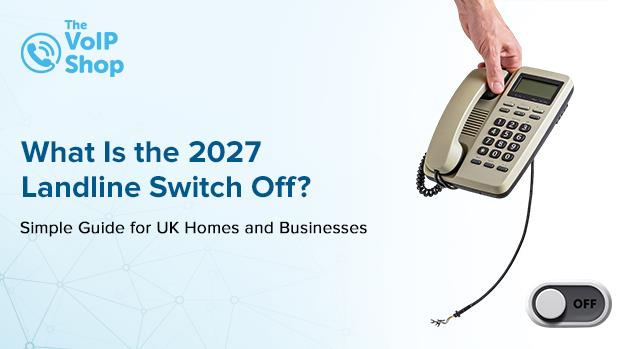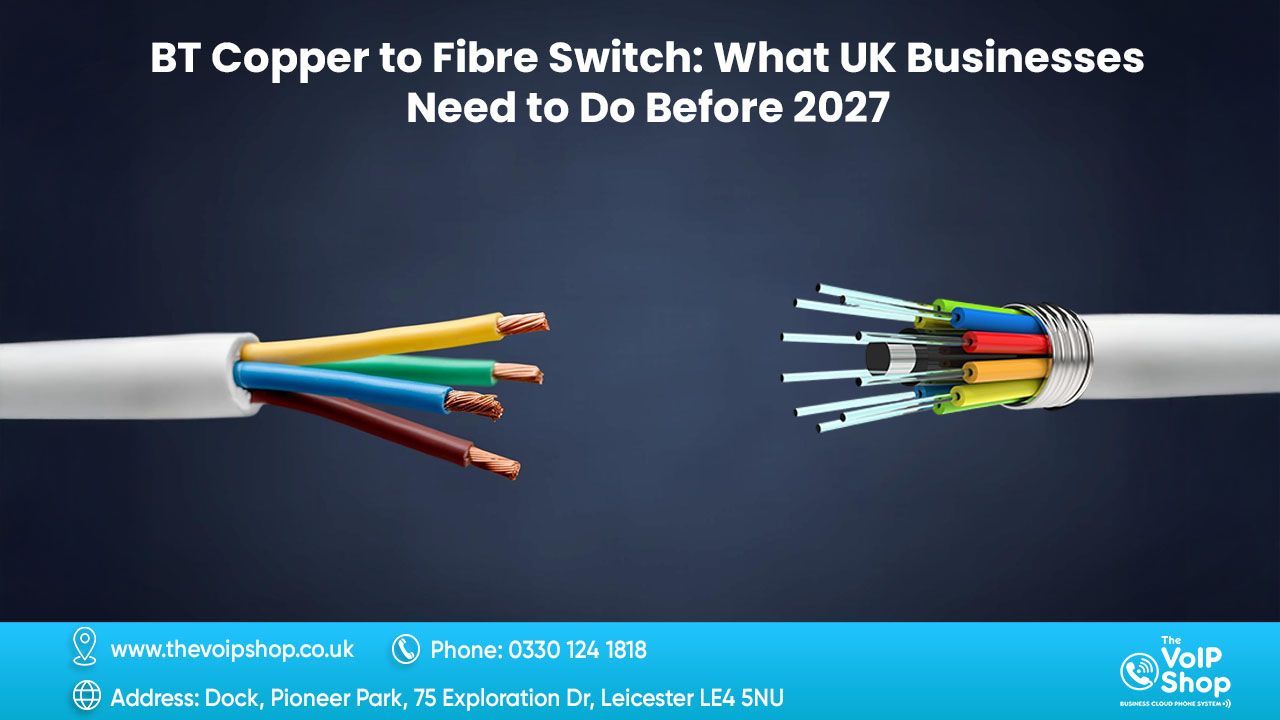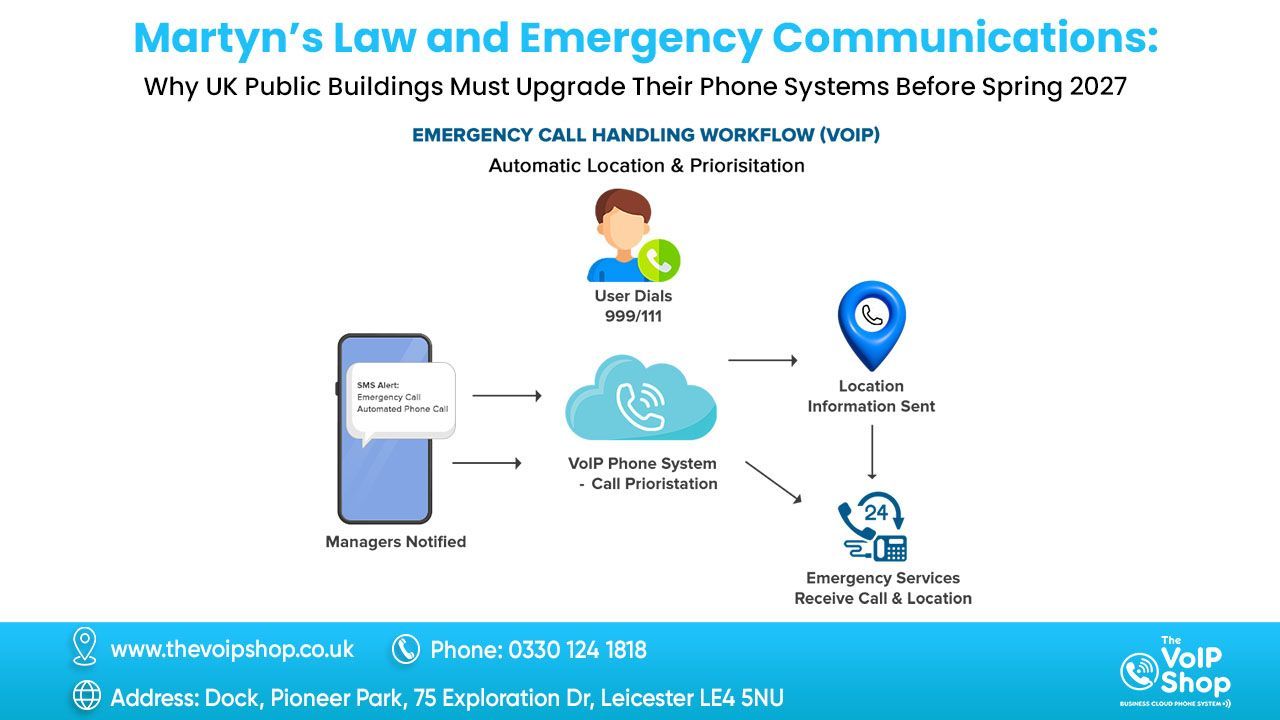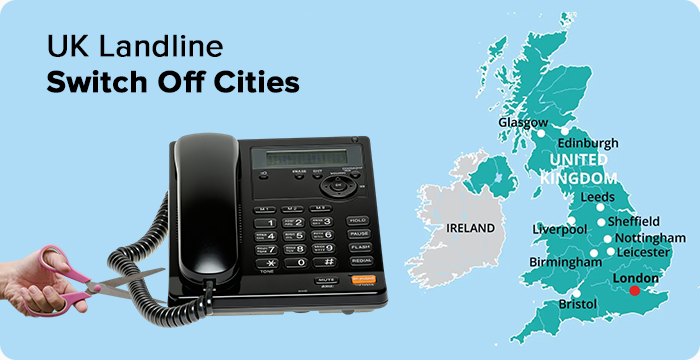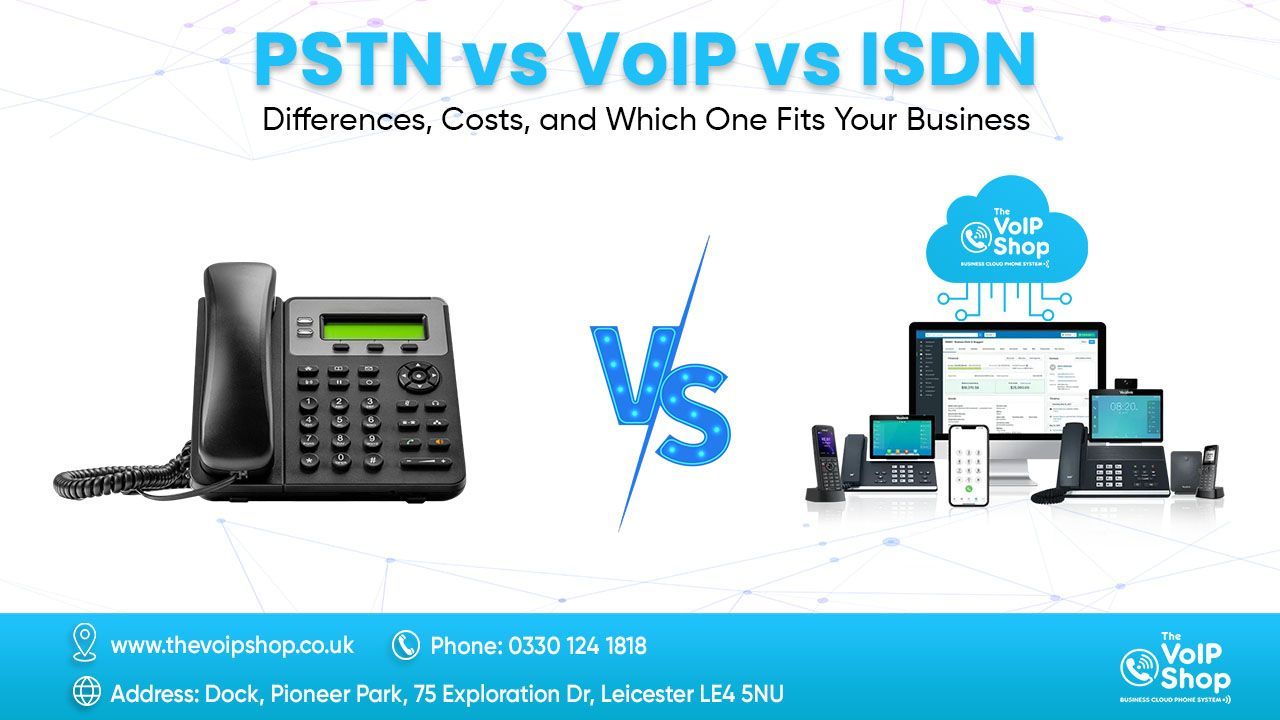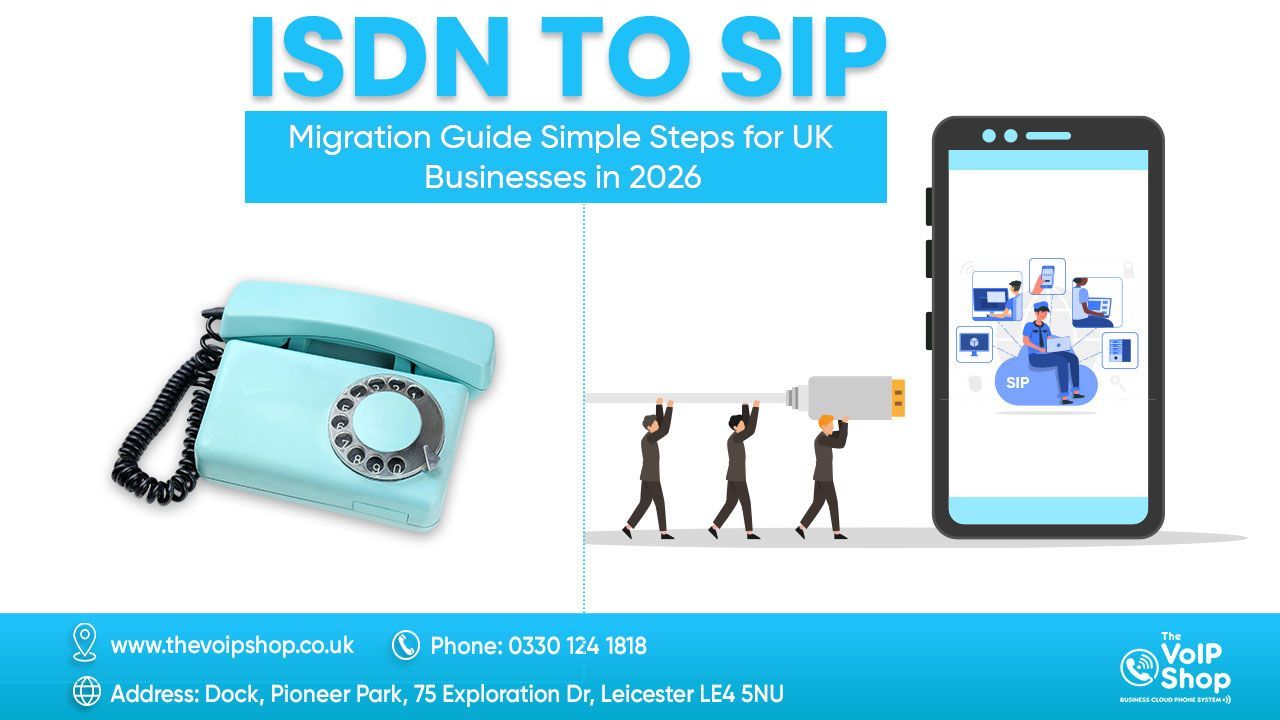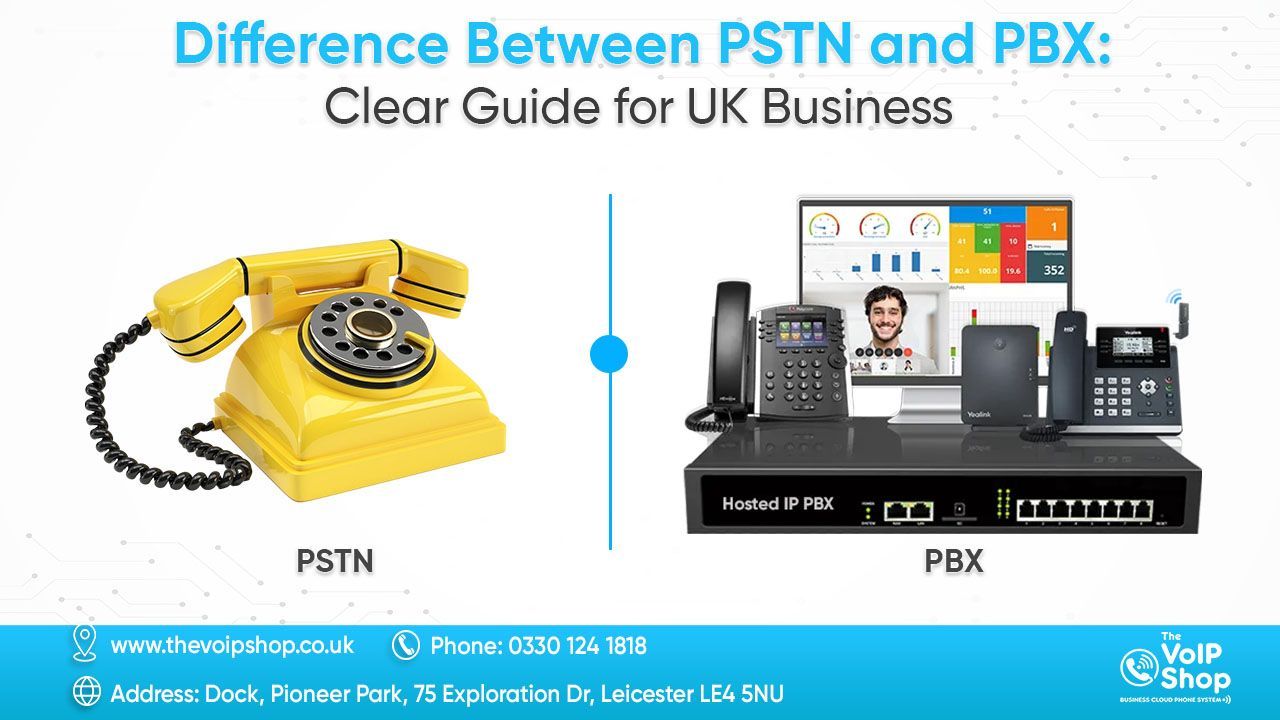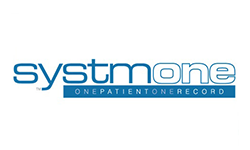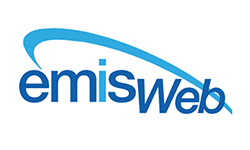What is FTTP Broadband? Fibre to the Premises Internet Explained Simply
FTTP broadband (Fibre to the Premises) provides an ultrafast internet connection directly to your office or home. Unlike traditional broadband, FTTP connects you straight to fibre-optic cables, delivering unmatched speeds and reliability. At The VoIP Shop, we've simplified FTTP, helping UK businesses understand exactly how this advanced broadband technology supports smarter, more productive working.
Ready to switch to faster, more reliable FTTP broadband?
Key Takeaways
- FTTP Broadband Defined Clearly: You’ll understand exactly what Fibre to the Premises (FTTP) broadband is, without confusing technical jargon.
- FTTP Benefits Explained: Find out precisely why FTTP offers superior speed, reliability, and business productivity compared to traditional broadband options.
- Cost and Installation Insights: Quickly discover typical costs and straightforward steps to install FTTP broadband, making your business decision easier.
- Comparison Clarity: Easily compare FTTP broadband with FTTC and ADSL, helping you make a smarter broadband choice.
- Availability and Next Steps: Know how to quickly check if FTTP is available in your area and how to smoothly transition your business to ultrafast broadband.
What Exactly is FTTP Broadband?
FTTP broadband, or Fibre to the Premises, is an internet connection delivered directly to your business or home through fibre-optic cables. This means ultra-fast broadband speeds because fibre cables connect your property straight to the internet provider, bypassing traditional copper phone lines entirely. Unlike FTTC (Fibre to the Cabinet)—which mixes fibre and copper cables—or ADSL broadband, which fully relies on copper wires, FTTP delivers faster, more reliable internet without slowdown or interruptions. In simple terms, FTTP internet gives your business the quickest possible online speeds and the highest connection reliability.
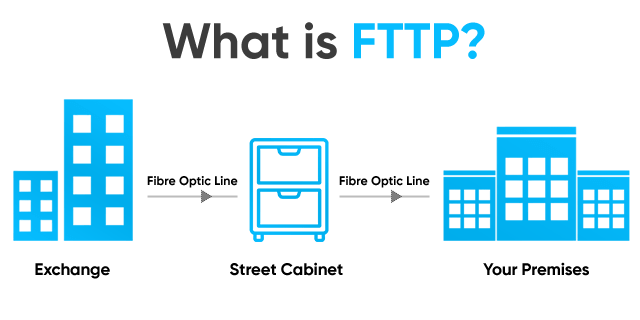
Still using outdated broadband? It’s time to explore FTTP.
How Does FTTP Internet Work?
FTTP internet works by connecting your business or home directly to your local internet exchange using fibre-optic cables. Here’s how the process works:
- Fibre-optic Cables: Thin cables made from glass or plastic fibres carry data using pulses of light rather than electrical signals. This allows incredibly fast data speeds.
- Local Internet Exchange: These fibre cables run straight from your internet provider's local exchange hub directly towards your premises, without interruptions or switching cables.
- Direct Connection to Your Premises: Fibre cables come directly into your property, ensuring you get consistent, ultra-fast broadband speeds.
Unlike older broadband methods, FTTP doesn’t rely on slower copper wires at all, which often limit speeds. This direct fibre connection means FTTP internet is significantly faster, more stable, and highly reliable, perfectly suited for business-critical tasks and daily operations.
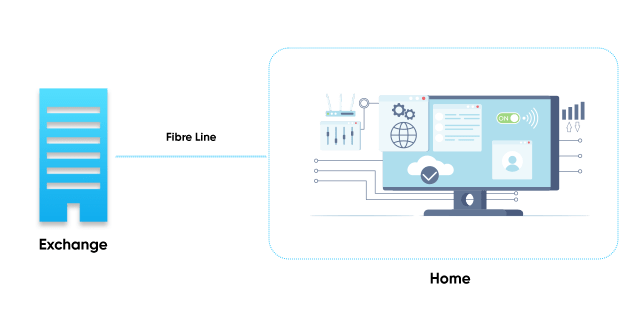
How Do I Get FTTP Installed for My Business?
Getting FTTP broadband installed at your business premises is straightforward, especially with The VoIP Shop guiding the process. Here’s exactly how installation works:
- Check Availability: First, confirm if FTTP broadband is available at your location.
- Book Installation Date: Schedule a convenient date and time for the engineer visit arranged by our support team.
- Engineer Visit: An experienced engineer will connect the fibre-optic cable directly into your premises. Typically, installations take just a few hours, with minimal disruption.
- Activate and Test: Once installed, your new FTTP internet is tested immediately, ensuring you have a stable and fast connection before the engineer leaves.
The VoIP Shop simplifies this entire process for you, from availability checks to final activation, handling all logistics to ensure minimal downtime. Typically, installations are completed within 2–3 weeks, and we’ll clearly communicate with you every step of the way.
Ready to upgrade your business to lightning-fast FTTP broadband?
Advantages of FTTP Broadband for Your Business
FTTP broadband brings significant business advantages, especially for SMEs needing fast, reliable internet. Key benefits include:
Significantly Faster Speeds (up to 1Gbps+)
FTTP internet delivers ultrafast speeds that help your team complete tasks quickly and efficiently, eliminating frustrating slowdowns common with traditional broadband.
More Reliable Connections and
Fewer Outages:
Because FTTP uses fibre-optic cables directly to your business, you'll experience fewer disruptions or outages, ensuring uninterrupted business operations.
Improved Remote Working Capabilities
FTTP broadband supports smooth, lag-free video conferencing, cloud access, and remote collaboration, enabling your team to effectively work from anywhere.
Enhanced Productivity and Collaboration:
Faster internet speeds and reliable connectivity significantly boost productivity, allowing seamless communication, file sharing, and real-time collaboration within your team.
Choosing FTTP broadband means choosing a broadband solution designed specifically for modern businesses—one that keeps you competitive, productive, and consistently connected.
Don’t let slow broadband hold back your growth—FTTP delivers real results.
FTTP vs FTTC vs ADSL – What's the Difference?
When choosing broadband for your business, understanding the differences between FTTP, FTTC, and ADSL is crucial. Here’s a quick and clear comparison to help you make the right decision:
| Feature | FTTP Broadband | FTTC Broadband | ADSL Broadband |
|---|---|---|---|
| Speeds | Ultrafast (up to 1Gbps+) using full fibre-optic cables direct to premises | Fast (typically 40-80Mbps), fibre to street cabinet, then copper cables to premises | Slowest (up to 24Mbps), copper cables only |
| Reliability | Highest reliability, minimal downtime or disruptions | Reliable, but potential speed reduction over distance due to copper cables | Less reliable, frequent speed fluctuations and interruptions |
| Installation | Engineer installation required (typically straightforward, few hours) | Usually simple engineer visit (often quick to install) | Quickest installation (uses existing copper lines) |
| Costs | Higher initial cost but excellent long-term value | Moderate cost, balancing speed and affordability | Lowest upfront cost but limited speeds and reliability |
| Future-proofing | Fully future-proofed, scalable speeds as tech advances | Partially future-proof, good short-to-medium term solution | Not future-proofed, increasingly outdated and restrictive |
FTTP broadband offers unmatched speed, reliability, and future-proofing, making it the best choice for businesses looking for stable, long-term connectivity solutions.
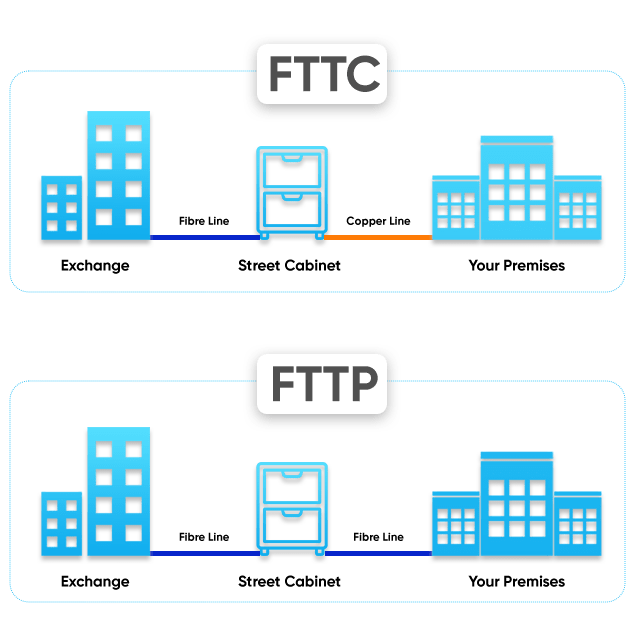
Is FTTP Broadband Available in Your Area?
FTTP broadband availability is rapidly expanding across the UK, thanks to major rollouts from providers like BT Openreach.
While many urban and suburban areas already have FTTP access, coverage in rural regions continues to improve steadily.
To quickly check if FTTP broadband is available for your business:
- Visit an FTTP broadband availability checker (such as the official BT Openreach checker).
- Enter your postcode or landline number.
- Instantly confirm if FTTP internet is accessible at your premises, or view estimated dates for upcoming availability.
BT Openreach is continually updating its rollout schedules, aiming to provide full-fibre (FTTP) coverage to over 25 million UK premises by 2026, significantly boosting business connectivity nationwide.
FTTP is rolling out fast—see if your business is ready for full fibre
How Much Does FTTP Cost?
The cost of FTTP broadband for businesses in the UK typically ranges from £30 to £80 per month, depending on your provider, speed requirements, and contract length. For SMEs, most packages offer download speeds between 150Mbps and 1Gbps, with faster options costing more.
Key factors that affect FTTP broadband pricing:
- Speed Requirements: Higher-speed packages (e.g. 1Gbps) usually come at a higher monthly rate.
- Installation Fees: Some providers may charge a one-time installation fee, especially in new-build or rural areas, while others offer free setup with a contract.
- Contract Length: Longer-term contracts often include discounted rates.
- Included Services: Bundles that include VoIP phone systems or static IPs may increase monthly costs.
Although the upfront cost may seem higher than ADSL or FTTC options, FTTP broadband delivers better long-term value. With faster speeds, higher reliability, and fewer outages, your business benefits from improved productivity and reduced downtime—making FTTP a cost-effective investment over time.
Smart broadband isn't just faster—it’s better value in the long run.
Why Choose The VoIP Shop for Your FTTP Broadband Needs?
When it comes to setting up FTTP broadband for your business, The VoIP Shop offers more than just fast speeds—we provide expert support every step of the way. As the UK’s only 5-star rated VoIP provider with NHS approval, we’re trusted by businesses nationwide for our proven reliability and customer care.
You’ll get:
- A dedicated account manager who understands your setup
- 24/7 UK-based support for peace of mind
- Over 10+ years of experience in business broadband solutions
- A worry-free installation process managed from start to finish
- Honest pricing with no hidden charges
We tailor each FTTP broadband package to suit your business size, internet usage, and future
growth—making your upgrade to fibre simple and risk-free.
Book Your Free FTTP Broadband Consultation Now
Frequently Asked Questions About FTTP Broadband
What is FTTP broadband and how does it differ from standard broadband?
FTTP (Fibre to the Premises) broadband uses fibre-optic cables all the way to your building, while standard broadband (like ADSL) uses copper phone lines. FTTP offers faster speeds, greater reliability, and fewer dropouts.
Is FTTP broadband faster than FTTC?
Yes. FTTP broadband delivers speeds up to 1Gbps or more, as the connection is 100% fibre. FTTC (Fibre to the Cabinet) mixes fibre with slower copper lines, which reduces speed as the distance from the cabinet increases.
Does FTTP require special installation?
Yes, FTTP installation typically involves an engineer running fibre-optic cable directly into your premises. It usually takes a few hours and is arranged by your provider. The VoIP Shop handles all this for you—stress-free.
How reliable is FTTP broadband?
FTTP is one of the most reliable broadband types in the UK. It’s less prone to interference, weather issues, and electrical noise—ensuring your business stays connected with minimal downtime.
Can FTTP help my business work remotely more effectively?
Absolutely. FTTP supports high-speed uploads and downloads, smooth video conferencing, and stable cloud-based tools—perfect for remote and hybrid working environments.
Is FTTP broadband worth the cost for SMEs?
Yes. While FTTP may have a slightly higher monthly cost, it saves businesses money in the long run through increased speed, less downtime, and improved productivity.
Can I keep my existing phone number when switching to FTTP?
Yes. If you’re also using VoIP phone services, your current business number can be ported over during installation without disruption.
What if FTTP broadband isn’t available in my area?
You can still explore fast alternatives like FTTC or SOGEA broadband. The VoIP Shop can check availability for you and help you plan the switch as FTTP rolls out to your location.
Is FTTP suitable for small businesses or just large offices?
FTTP is ideal for businesses of all sizes. Whether you’re a team of 3 or 30, the speed and reliability of FTTP broadband supports better day-to-day operations, cloud usage, and customer communications.

